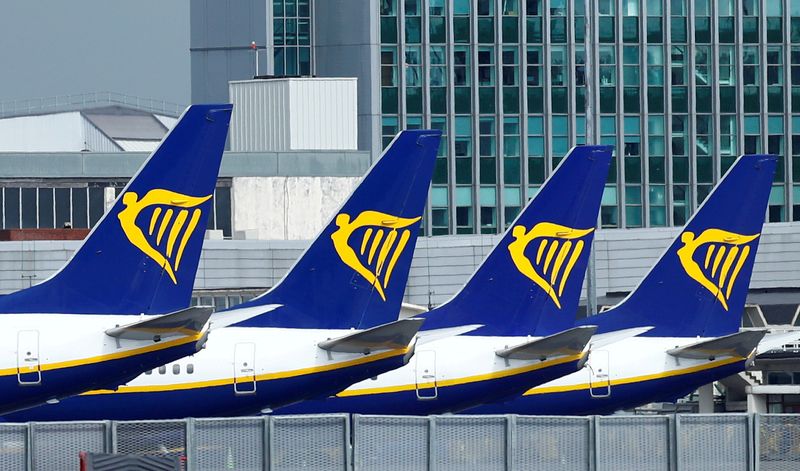Ryanair Q1 profits soar, cuts FY passenger forecast on Boeing delays
2023.07.24 01:19

© Reuters. FILE PHOTO: Ryanair planes are seen at Dublin Airport, following the outbreak of the coronavirus disease (COVID-19), Dublin, Ireland, May 1, 2020. REUTERS/Jason Cairnduff/File Photo
DUBLIN (Reuters) -Ryanair on Monday posted a 663 million euro ($737.26 million) after-tax profit for the three months ending in June, far above pre-pandemic levels, but lowered its passenger growth forecast for 2023 because of Boeing (NYSE:) delivery delays.
The Irish airline, Europe’s largest by passenger numbers, added that it had already received indications from Boeing that some deliveries of 737-8200s jets may be delayed from April 2024 to June 2024, potentially impacting this winter and next spring.
It now expects traffic in the year to March 2024 to grow by 9% to around 183.5 million compared to the 185 million originally expected.
Chief Financial Officer Neil Sorahan told Reuters he was not as concerned about the delays as he was a few months ago, that Boeing had improved significantly and deliveries were more recently hit by factors outside the planemaker’s control.
Ryanair, which flew a record number of monthly passengers both in May and June, saw average fares jump by 42% year-on-year in the quarter on a strong Easter and a weaker comparative period that was impacted by Russia’s invasion of Ukraine.
Ticket pricing for bookings for the July-September quarter, typically Ryanair’s most profitable period of the year, is expected to rise year-on-year by a low double digit percentage, Ryanair said
“We noted a softening in close-in fares in late June and early July,” Chief Executive Michael O’Leary added in a statement.
“We are conscious that consumers may require some fare stimulation to fill our 25% greater seat capacity this winter (compared to pre-Covid) following months of rising mortgage rates and consumer price inflation.”
The profit for the first quarter of Ryanair’s fiscal year was a four-fold increase on the 170 million euro a year ago when air travel began to take off following COVID-19 lockdowns and beat the previous high for the period, 397 million euros in 2017.
The final number compared with a forecast of 620 million euros in a company poll of analysts.
($1 = 0.8993 euros)








